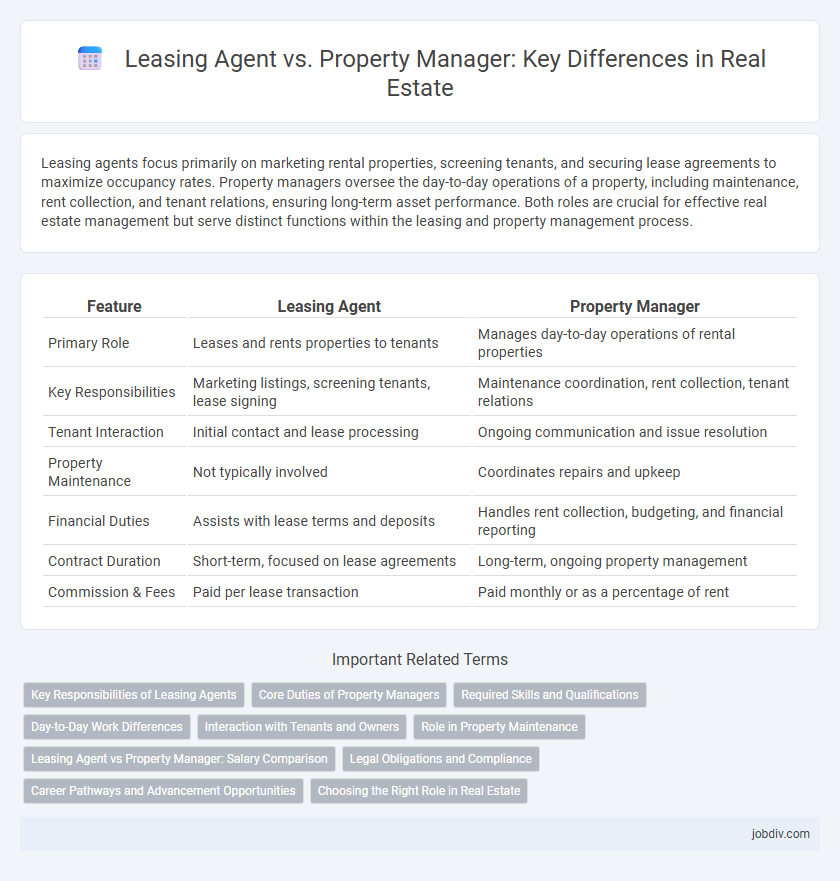Leasing agents focus primarily on marketing rental properties, screening tenants, and securing lease agreements to maximize occupancy rates. Property managers oversee the day-to-day operations of a property, including maintenance, rent collection, and tenant relations, ensuring long-term asset performance. Both roles are crucial for effective real estate management but serve distinct functions within the leasing and property management process.
Table of Comparison
| Feature | Leasing Agent | Property Manager |
|---|---|---|
| Primary Role | Leases and rents properties to tenants | Manages day-to-day operations of rental properties |
| Key Responsibilities | Marketing listings, screening tenants, lease signing | Maintenance coordination, rent collection, tenant relations |
| Tenant Interaction | Initial contact and lease processing | Ongoing communication and issue resolution |
| Property Maintenance | Not typically involved | Coordinates repairs and upkeep |
| Financial Duties | Assists with lease terms and deposits | Handles rent collection, budgeting, and financial reporting |
| Contract Duration | Short-term, focused on lease agreements | Long-term, ongoing property management |
| Commission & Fees | Paid per lease transaction | Paid monthly or as a percentage of rent |
Key Responsibilities of Leasing Agents
Leasing agents are primarily responsible for marketing rental properties, conducting property tours, and screening prospective tenants to ensure qualified applicants. They handle lease negotiations and prepare rental agreements, facilitating smooth move-ins and renewals. Leasing agents also maintain communication with tenants regarding lease terms and property policies to foster positive tenant relationships.
Core Duties of Property Managers
Property managers oversee daily operations of rental properties, including tenant relations, rent collection, and maintenance coordination. They ensure legal compliance, handle lease agreements, and manage budgeting for property expenses. Their role is comprehensive, focusing on maximizing property value and ensuring smooth property management.
Required Skills and Qualifications
Leasing agents require strong interpersonal skills, sales expertise, and knowledge of rental laws to effectively attract and secure tenants. Property managers must possess advanced organizational abilities, financial acumen, and experience in maintenance oversight to handle day-to-day operations and tenant relations. Both roles demand proficiency in property management software, but property managers often need certifications such as CPM (Certified Property Manager) or ARM (Accredited Residential Manager).
Day-to-Day Work Differences
Leasing agents primarily handle tenant acquisition by marketing properties, conducting showings, and processing rental applications. Property managers focus on ongoing property maintenance, rent collection, and addressing tenant concerns to ensure smooth operations. The leasing agent's daily tasks revolve around occupancy rates, while property managers concentrate on property upkeep and tenant satisfaction.
Interaction with Tenants and Owners
Leasing agents primarily focus on attracting and screening tenants, conducting showings, and executing lease agreements, ensuring a smooth move-in process. Property managers oversee ongoing tenant relations, handling maintenance requests, rent collection, and lease enforcement while communicating regularly with property owners to report on financial performance and property conditions. Effective collaboration between leasing agents and property managers enhances tenant satisfaction and optimizes property owner returns.
Role in Property Maintenance
A leasing agent primarily focuses on marketing rental properties, screening tenants, and managing lease agreements, with limited involvement in property maintenance. Property managers oversee all aspects of property maintenance, including coordinating repairs, routine inspections, and ensuring compliance with safety regulations. Their hands-on role ensures the property's condition is preserved and tenant issues are promptly addressed.
Leasing Agent vs Property Manager: Salary Comparison
Leasing agents typically earn an average annual salary ranging from $35,000 to $50,000, depending on location and experience, while property managers command higher salaries, often between $50,000 and $75,000 per year due to their broader responsibilities. Commission and bonus structures can significantly augment leasing agents' earnings, especially in high-demand markets, whereas property managers may receive performance bonuses linked to property profitability. Geographic location, property type, and company size also influence compensation variances within both roles in the real estate industry.
Legal Obligations and Compliance
Leasing agents primarily handle tenant screening, lease agreements, and regulatory disclosures to ensure compliance with local and federal housing laws, such as the Fair Housing Act. Property managers have broader legal responsibilities, overseeing property maintenance, rent collection, eviction processes, and compliance with health and safety regulations. Both roles require adherence to landlord-tenant laws and timely reporting to avoid legal liabilities and maintain regulatory compliance.
Career Pathways and Advancement Opportunities
Leasing agents typically begin their careers by handling tenant relations, marketing rental properties, and processing applications, providing a foundation in customer service and real estate operations. Property managers advance by overseeing property maintenance, budgeting, and lease enforcement, requiring broader management skills and often leading to senior roles such as regional manager or asset manager. Career progression from leasing agent to property manager is common, with professional certifications like Certified Property Manager (CPM) enhancing advancement opportunities.
Choosing the Right Role in Real Estate
Choosing between a leasing agent and a property manager depends on your career goals and skill set in real estate. Leasing agents specialize in marketing rental properties and securing tenants, while property managers handle property maintenance, rent collection, and tenant relations. Understanding the distinctions helps investors and professionals align their expertise with either tenant acquisition or comprehensive property oversight for optimal returns.
Leasing Agent vs Property Manager Infographic

 jobdiv.com
jobdiv.com